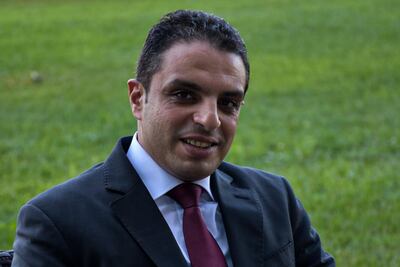Gamal Aboul Hassan has long been obsessed by books that attempt to simplify science or complex theories.
They fill a gap in the knowledge of most Arab readers, he explains; a basic idea of, say, how our universe works, human evolution or how our galaxy came to be.
An Egyptian career diplomat, Aboul Hassan, 43, set out to try to fill that void more than seven years ago, five of which he spent researching and two writing.
The end product is 300,000 Years of Fear, a 378-page book that recounts and interprets the history of our planet, starting with the birth of our universe 13.8 billion years ago through to the emergence of man as far back as 300,000 years ago; not the beginning of agricultural settlement 10,000 years back or the rise of civilisations roughly 5,000 years later.
The book, now in its fourth edition, has been given a warm welcome in Egypt as a pioneering historical work, earning the author national publicity through a wave of TV appearances, interviews and book reviews.
It is unique in that it is a "Big History" book, which traditionally offers a comprehensive account of history, starting with the Big Bang, and which views the emergence of the human race and its contribution as one phase in the history of the planet rather than the single most important one.
It also treats such phenomena as natural disasters, pandemics and climate change as events that have affected the life of both man and animal, linking them, for example, to the demise or rise of civilisations and empires.
The book doubles as an easy-to-grasp introduction to a number of scientific disciplines and what is in effect an alternative way of reading history, veering away from traditional methods.

"For man to understand the world he lives in, he needs to have basic knowledge of sciences," Aboul Hassan tells The National in an interview. "For example, to understand artificial intelligence one must not only know how computers, information technology and the digital world work but must also understand how organic intelligence works.
"But it is not an academic or a history book."
Big History is by definition a method that seeks to understand the development and integration of the cosmos, Earth, life and humanity, using the best available empirical evidence and scholarly methods.
Beginning about 13.8 billion years ago, the story of the past is a coherent record that includes a series of seismic thresholds such as the Big Bang.
Aboul Hassan's book takes the form of 10 letters written by the author and emailed to his Covid-stricken daughter who had asked for his help in dealing with a mix of anxiety and fear while in self-imposed quarantine.
"Write back to me, papa! But don't repeat your famous phrase 'don't worry.' That particular phrase raises my level of fear and anxiety to the maximum," writes fictional daughter Leila.
The choice of the coronavirus pandemic as a theme of the book's narrative is far from random, says Aboul Hassan.
The pandemic emphasised the family-like bond that ties together the planet's eight billion inhabitants despite borders, cultural and linguistic differences and economic discrepancies, he explains.
author
People across the world were united in demanding that scientists sped up their quest for a vaccine, he adds. During lengthy lockdowns, they shared similar experiences, using social media to communicate, worked remotely and watched TV series, films and documentaries on streaming platforms.
When vaccines were eventually found, everyone wanted to share it quickly in a show of universal empathy in the face of a pandemic that killed millions, Aboul Hassan says.
"The truth, my dear, is that the coronavirus pandemic is the latest in an uninterrupted series that links us to our very distant past," the author replies to his daughter.
"Calamities and crises are not unique events in our human story," he writes, before going on to cite natural disasters, cosmic events or pandemics that shaped our shared history, from the demise of the dinosaurs millions of years ago to the Black Death in the 14th century and the Spanish flu of the previous century.
Packed with obscure scientific facts and historical anecdotes, the author's letters to his daughter simplify in elegant and lively language complicated theories, philosophical issues and milestone events. These explore whether good and evil are two sides of the same coin, the causes of the demise of Egypt's ancient civilisation, the art of war, the pursuit of eternity and the rise of states.
Aboul Hassan acknowledges, with a hint of glee, that the publishing house which adopted the book took a huge risk printing a Big History book in an era in which fiction, mostly by young authors, dominates the local market, leaving little room for other genres.
"The success of the book surprised me," he says. "It is neither fiction nor history. The publishers were certain the book would not go far. Even my wife did not like it. But for a book like that to be in its fourth edition a couple of months after its publication is a success story."


